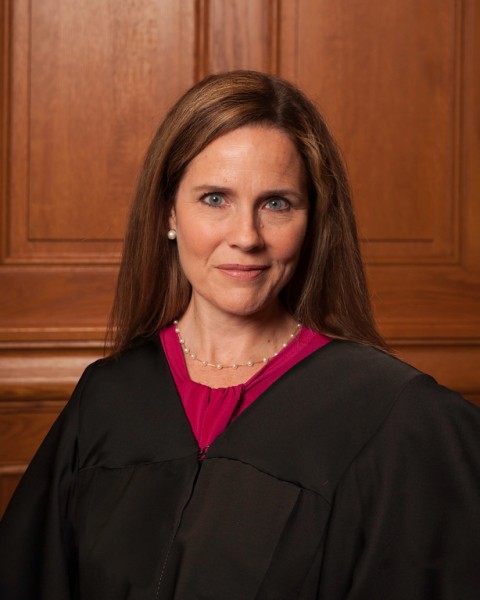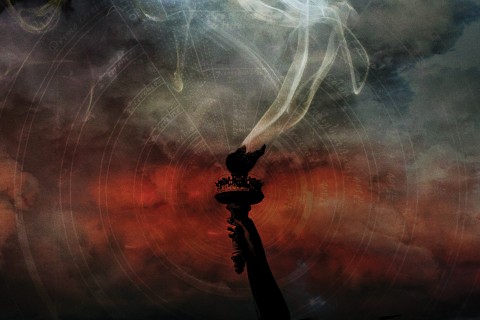What Amy Coney Barrett’s nomination doesn’t mean
Don’t bother looking for the political significance of the Supreme Court nominee’s Catholicism. There isn’t any.

On Saturday, President Trump nominated federal appeals court judge Amy Coney Barrett to fill the Supreme Court vacancy left by the death of Ruth Bader Ginsburg. Barrett would be the court’s sixth Catholic member (not counting Neil Gorsuch, who grew up Catholic but has since been affiliated with the Episcopal Church). Still, superfans and detractors alike have seized on her religion as a defining factor in her nomination.
Most of this commentary has been unhelpful, whether it’s obtuse references to The Handmaid’s Tale or icons of “The Glorious ACB” with a halo. But two of America’s more prominent commentators on religion and American politics—Ross Douthat on the Never-Trump right and Elizabeth Bruenig on the left, both at the New York Times—have tried valiantly to find a deeper meaning in this nomination. Both failed, and in doing so taught readers an important lesson on the functional disappearance of religion from the public square.
For Douthat, whose insightful book on worldwide economic and cultural decadence I reviewed earlier this year, Barrett represents the possibility of a new kind of “conservative feminism,” distinct from both the liberal feminism pioneered in the 1970s by people like Ginsburg and the backlash to it. This strain of feminism would integrate a recognition that Ginsburg’s legal advocacy opened real opportunities for women and overcame real injustices with “ideas from the old regime about the centrality of marriage, children and religious commitment to the good life.”
Douthat acknowledges that this tendency doesn’t really exist. But he’s earnest in wishing that it would, and he casts a modest measure of hope on the influence of a judge who has, after all, combined a high-flying legal career with raising seven children. He ends with a pointed question for the conservative movement: “What is it doing in its policymaking to make her kind of life, professionally impressive and personally full, feel more available and affordable and imaginable for women who aren’t nominated to the Supreme Court?”
The answer to this question is “nothing,” and no one looking at Barrett’s writings or judicial record has even attempted to make the case that she will be anything but a down-the-line conservative on virtually every issue. If there’s a new feminism on offer here, it will integrate Ginsburg’s opening of male domains for professional women with a strong commitment to forbidding federal agencies to regulate pollution.
Bruenig, on the other hand, is not content to read a modest pro-family correction to the feminist trajectory into Barrett’s nomination. Instead this nomination has “renewed attention to a fundamental conflict, centuries underway, between Catholicism and the American ethos.” America, Bruenig claims, is founded on a Lockean liberal concept of public and private spheres which Catholicism does not recognize. She points out that she, too, is Catholic, but this did not stop her column from being read by conservatives as an attack on Catholicism, fueling its own outrage cycle.
And indeed, Bruenig’s argument is so thin and yet phrased so provocatively that one almost imagines the misreading was an intended result. The “fundamental conflict” between Catholicism and America does not exist. Barrett will join a conservative court majority long led by Catholic members whose full integration into the conservative legal and political movement has long since been achieved. (Indeed, the court’s most eloquent and principled progressive is also Catholic, though that fact almost never comes up.) Major right-wing business donors immediately geared up to spend money supporting Barrett’s nomination. If there is a conflict between America’s libertarian ethos and Barrett’s commitments, nobody has told them.
Both of these writers want the appointment of a publicly identified Catholic to mean something. (In the rhetoric of news coverage she is “pious” or “devout,” adjectives never applied to Joe Biden.) But it doesn’t. It means nothing. This is not a criticism of Judge Barrett personally. It is simply a fact of political decisions with such high stakes. However a judge wants to relate their faith to their view of the law, they will only be nominated to such a role if they are considered reliable members of their ideological faction.
Bruenig points to a recent decision exempting Catholic school teachers from labor laws as a point of essential conflict between Catholicism and American conceptions of law. But both the opinion and the dissent were written by Catholic justices. One of them always votes in favor of employers against workers, the other always votes for workers over employers. Their religious identity adds nothing to the question.
No one really cares what any of us believes about Christian doctrine. Accusations of religious bias or casting about for some reason to claim that a nominee’s religion will bear any weight in their judicial worldview are just ways to distract ourselves from this truth. Like pretty much all other Christians, Catholics have long been assimilated into America’s class, race, and cultural structures. The real fault lines are not between religious identities but within those structures. Turning a Supreme Court nomination into an exercise in religious identity politics obscures the fact that Amy Coney Barrett could just as well be an atheist or a Scientologist and reach the exact same conclusions on every case she will ever face.
The question for Christians in America is not how we will hold together the pieces of identities that stopped cohering generations ago and now can only offer a bogus sense of grievance or some lapidary phrases for our secular leaders to borrow. It’s how we will face that class, race, and cultural structure into which we have been fully integrated. The inherent conflicts of that structure will unfold whether we acknowledge them or not, and every political institution will intervene in those conflicts, the court very much included.
The only relevant “religious” question for Amy Coney Barrett, or for any judge, is how she will rule. And there seems to be little mystery about that.






